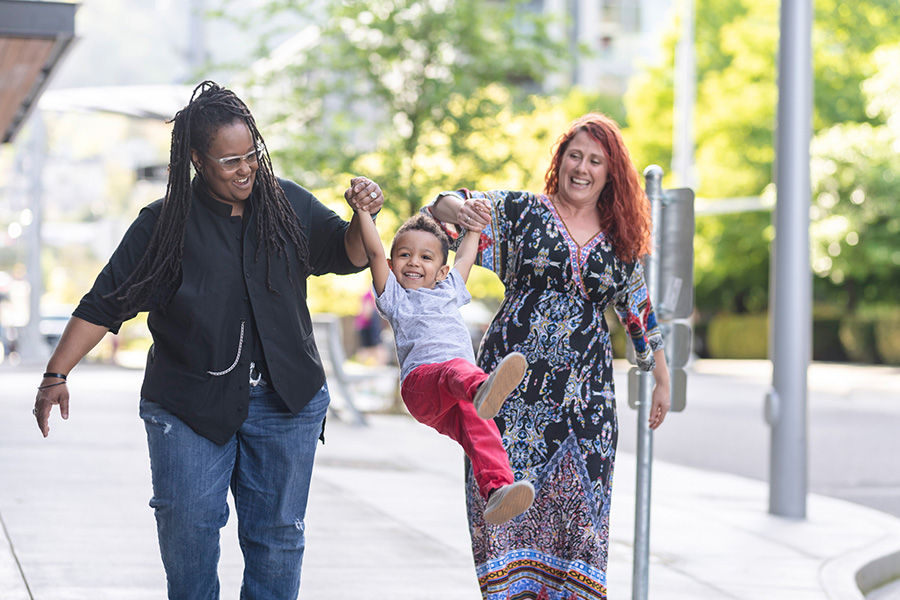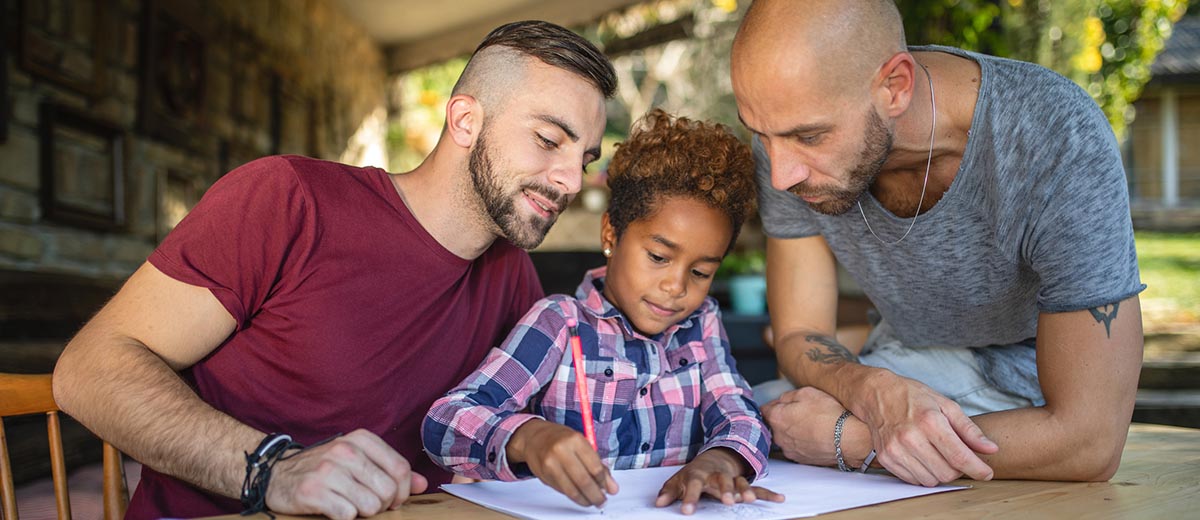Prospective LGBTQ+ parents looking to adopt are faced with a lot of choices. Here, we explore key decisions you’ll need to make when determining the right adoption path for you and your family, and the associated costs.
Adoption is a popular way for many LGTBQ+ people to expand their families. Compared to their straight counterparts, LGBTQ+ families are seven times more likely to adopt or foster children, according to the Williams Institute at UCLA. However, there’s no single path to adoption.
In fact, LGBTQ+ families have several options when determining how and where they want to adopt. Decisions range from whether to adopt domestically or internationally to choosing to work with a private agency or pursue adoption independently. Other considerations include whether a closed or open adoption is right for your family, and if you’re open to fostering to adopt.
As you might imagine, these options incur different costs, which we’ll explore below.
Domestic vs. international adoption for LGBTQ+ parents
Costs involved: Domestic adoptions average $25,000 to $48,500, and typically include a range of fees, from the home study and legal services to document preparation and birth family counseling. International adoptions average $35,000 but can be upward of $50,000 to help cover additional expenses like passports and translation costs.
Hidden costs to prepare for: Whether you choose to adopt domestically or internationally, remember to account for travel costs. If traveling internationally, visas may be required, along with plane tickets and lodging. Plus, some countries may require adopting parents to stay in-country for several weeks or visit multiple times during the adoption process.
Domestic adoption may also require travel to where the birth mother lives and coverage of their living expenses. If adopting out of state, an Interstate Compact on the Placement of Children (ICPC) placement request must be submitted and approved before the child can be placed in another state. ICPC approval is typically granted within a few days but sometimes takes longer, so accommodation in the birth state must be arranged.
Pros and cons: Some key differences between adopting domestically vs. internationally include the age of the child. Adopting a newborn (which requires additional financial preparation) is only possible domestically.
Beyond age, a more holistic medical history is usually provided with domestic adoptions than international ones. Many adopting parents who don’t want contact with the birth family choose to adopt internationally, however, several countries do not allow LGBTQ+ people to adopt, as shown on this map.
Timeline: Wait times for domestic and international adoptions are often comparable. While adopting from foreign countries has historically been faster, the gap is closing, and prospective parents may have a child within two years, though it could take longer.
Foster to adopt for LGBTQ+ parents
Costs involved: Compared to adopting through a private agency, adoption through foster care is usually funded by the state, so fees are minimal—or even nonexistent.
Hidden costs to prepare for: While subsidies will likely cover many expenses you pay up front, it’s worth budgeting for home study fees, which can range from $1,000 to $5,000. Additional costs may include matching and advertising fees, and any potential agency fees.
Pros and cons: While foster to adopt is one of the most affordable ways to adopt, it does not always guarantee a permanent placement. Children are temporarily placed in homes with foster parents during their birth parents’ court proceedings. If the parents’ rights are fully terminated, then a forever home will be needed. However, there are many children in the foster care system whose parents have already had their rights revoked, or who have no guardian due to being orphaned.
Timeline: The process of fostering to adopt is highly dependent on the parents’ court case, but it’s generally a lengthy wait compared to other adoption options. A judge must determine that reuniting the child with their biological parents is impossible —which sometimes does not happen — before adoption is an option for the foster parents.
Closed vs. open adoption for LGBTQ+ parents
Legal protections: The Child Welfare Information Gateway and OPA explain that in both types of adoption, the permanent legal rights and responsibilities for the child reside with the adoptive parents. In an open adoption, birth parents may have contact with the adopted child and adoptive parents, but this may look differently depending on the level of openness: In a fully open adoption, the birth parents, adoptive parents and the adopted child may communicate directly, while communication in a semi-open adoption goes through a third party, like a lawyer or agency caseworker. In a closed adoption, the adoptive parents and birth parents remain anonymous and neither communicates with one another.
Pros and cons: Open adoptions grant adoptive parents access to more background information about the child’s family and provide an opportunity to ask questions, however sometimes the adults’ roles may become muddled. While closed adoptions avoid this potential issue, adoptive parents in closed adoptions are generally less informed about the child’s background beyond medical information.
Private agencies vs. independent adoptions for LGBTQ+ parents
Costs involved: When working with a private agency in the U.S., the average cost of adoption is $30,500 to $48,500. Adopting independently — where the birth mother chooses the adoptive parents — can be slightly less expensive, with costs ranging from $25,000 to $38,000.
Hidden costs to prepare for: Whether adopting independently or through a private agency, adoptive parents should budget for any travel required and accommodation while waiting for ICPC approval if adopting from another state. Those adopting independently should expect to spend more in legal fees — roughly $7,000 to $15,000 — to aid in navigating the terms of the adoption.
Pros and cons: If you choose to work with a private agency, you’re more likely to pay an all-inclusive fee, whereas the responsibility for finding professionals like an attorney lies with the adoptive parents if adopting independently.
Timeline: Adopting through a private agency usually takes up to two years to complete. Adopting independently can be quicker, as there are no waitlists or potentially restrictive qualifying criteria.
How LGBTQ+ families can financially prepare for adoption
While costs may feel high, there are several steps you can take now to financially prepare to adopt and ways to help make it more affordable. If you are open to inviting others on your adoption journey, consider tapping into your community and invite them to donate via AdoptTogether, or other crowdsourcing platforms. It’s also worth checking with your employer to see if they offer any adoption assistance programs. Plus, you can claim $14,300 per child on your federal tax return via the Adoption Tax Credit.
Visit our family planning resource page to learn more about your financial options.








